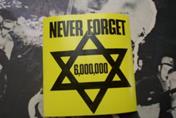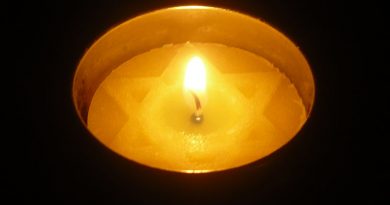Two Minutes
 Today is Yom Hashoah, Holocaust Remembrance Day. Here in Israel a two-minute siren just went off. The country mostly stops – cars pull over, drivers stand respectfully by their cars, everything just stops, for two minutes. I work from home; the one daughter who was at home at the time and I stood outside.
Today is Yom Hashoah, Holocaust Remembrance Day. Here in Israel a two-minute siren just went off. The country mostly stops – cars pull over, drivers stand respectfully by their cars, everything just stops, for two minutes. I work from home; the one daughter who was at home at the time and I stood outside.
No matter how much I try and think about it, I just can’t get my head around the numbers. Numbers that I suppose most adult Jews have burned into their memory. 6 million Jews murdered by the Nazis, 1.5 million of them children. 90% of European Jewry wiped out by the schemes of a madman who pursued Anti-Semitism on an industrial scale with Germanic efficiency.
But how do you relate to 6 million? It’s too abstract. I was thinking about this number. What are some other ways to conceptualize 6 million? With a two minute siren it means that each life gets 1/50,000 of a second. For those who think scientifically, that’s 1/50 of a millisecond. Going in the other direction, that’s 50,000 Jews murdered every second. For three years I lived in Toledo, Ohio, a city of about 200,000 people. So I was thinking to myself that it’s as if every four seconds the population of Toledo were completely wiped out. There are about 500,000 Jews living in Jerusalem, so every ten seconds the lives of every Jew in Jerusalem slip past – and yet that siren goes on and on and on.
What if we gave every one of the 6 million a second of their own? A second – barely enough time for a name to flash on a screen, be registered, and be gone. One single second representing a life, a life that was an entire world of its own, a life filled with love, fear, hope, despair, family, friends, work, all of it, reduced to one second. At that pace it would take 69 days – over two months, 24×7 – to give each name one lousy second.
The difficulty of connecting with such abstract numbers is why it’s important to make memorial ceremonies more personal. Last night at shul we read Megillat Hashoah, which tells the story of the Shoah in a traditional format, similar to the book of Lamentations – in fact several chapters of it are chanted using the melodies we use when we recite Lamentations on Tisha b’Av. Megillat Hashoah brings a few stories from those dark days as well as giving the big picture. But for stories there’s no substitute for hearing them first hand, and as I was watching a fellow congregant share slides from a “roots” journey she made visiting the places where her father grew up in Germany before fleeing the Nazis I was thinking how the generation that are children now are the last generation that will have an opportunity to hear what happened in Europe in those dark days directly from the mouths of survivors. The survivors are all aging. In another ten years, the oldest survivors will have been children during those horrible times, and in 20 years there will barely be anyone around who has direct memories of those times at all. I wonder whether families will be able to keep their family memories alive after the last of the survivors are gone. It’s inevitable that the trauma will slip away. In a few centuries the Holocaust will be remembered the same way we remember the destruction of the Temple and the crushing of the Bar Kochba revolt. Tragedies, but without the force of personal memory.
Memory is meaning. Memory is acknowledging. And interestingly, acknowledgment of the Holocaust came from an unexpected source today: Mahmoud Abbas, president of the Palestinian Authority, who called the Holocaust the “most heinous crime” committed by modern man. Our government, of course, was quick to dismiss his statements. Binyamin Netanyahu never misses an opportunity to appear churlish. If there’s a less gracious politician on the face of the planet I don’t know who it would be. But Abbas is taking what I think is a far more effective approach than the Holocast-deniers of the Arab world. Deny the Holocaust and you only look like a fool and will be unsympathetic in the eyes of the West. Much more effective to acknowledge the Holocaust, and then ask the Jews, how could you, of all people, who suffered so much during the Shoah, act in a harsh and abusive manner to another people? You who were killed because of your Jewish “race,” how could you oppress another people because they don’t belong to your religion?
Oppression still abounds. Murder of innocents is still happening. The rallying cry of the remembering of the Holocaust is supposed to be “never again,” but we do let it happen again, and again. Just not to Jews. Yes, thank God we have Israel. But in God’s eyes all lives are precious – including Rwandans, Cambodians, and Syrians. The powers of the world need to intervene in places not only where it’s in their “strategic (financial)” interests, but where it’s simply the right thing to do.
We’re still waiting for the political leadership of the world to really hear the message, “never again.”


Never forget never